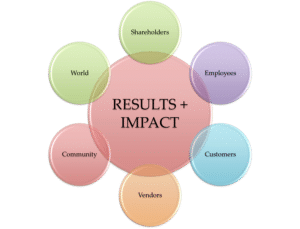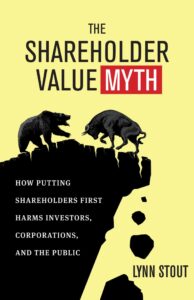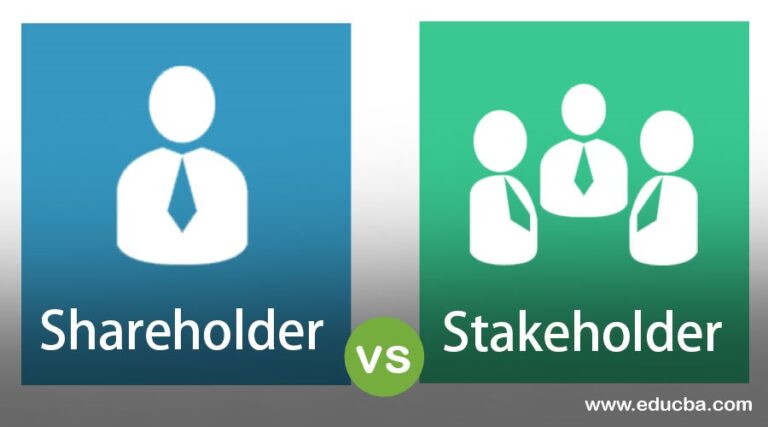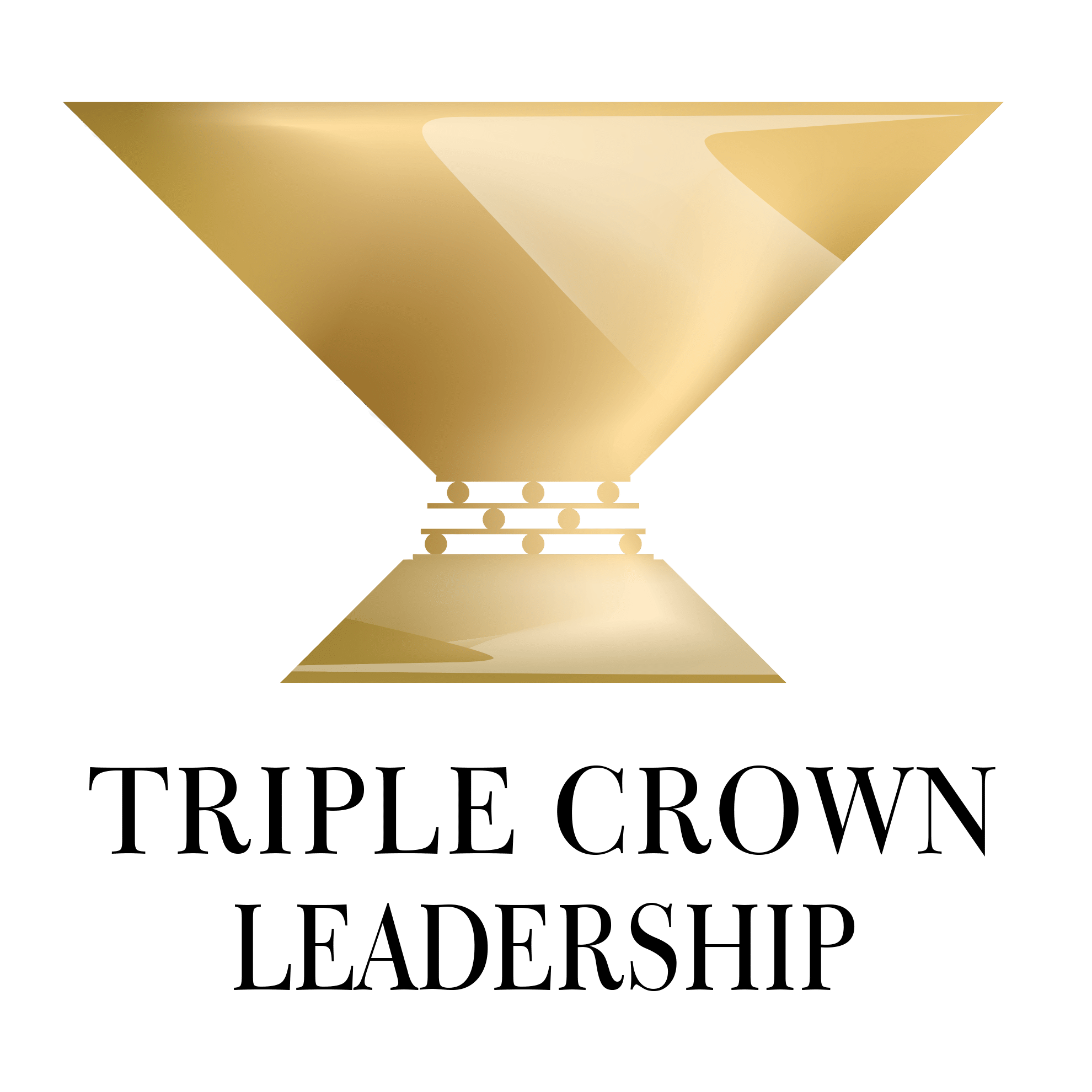A big debate has been raging about the purpose of business for decades. Two opposing theories dominate the discussion: shareholder primacy theory and stakeholder theory. How does Robert Greenleaf’s servant leadership framework fit with these models?
Shareholder Primacy Theory
In 1970, Milton Friedman (a noted conservative economist at the University of Chicago) wrote an influential New York Times Magazine essay, “A Friedman Doctrine: The Social Responsibility of Business Is to Increase Its Profits.” He argued that a company’s only responsibility is to its shareholders who “own the business.”
Friedman wrote:
“The stockholders or the customers or the employees could separately spend their money on the particular [social] action if they wished to do so.”
Quoting from his 1962 book, Capitalism and Freedom, Friedman said:
“There is one and only one social responsibility of business—to use its resources and engage in activities designed to increase its profits as long as is stays within the rules of the game, which is to say, engages in open and free competition without deception or fraud.”
Thereafter, the “Friedman doctrine” became the raison d’etre of many business leaders and board members. Their shorthand version of the doctrine: Maximize shareholder value.

Personal Values Exercise
Complete this exercise to identify your personal values. It will help you develop self-awareness, including clarity about what’s most important to you in life and work, and serve as a safe harbor for you to return to when things are tough.
Stakeholder Theory
During the 1960s, notably at the Stanford Research Institute, the concept of stakeholder responsibility began appearing. R. Edward Freeman, a professor at the University of Virginia, published a book in 1984 titled, Strategic Management: A Stakeholder Approach. Freeman is considered the “father of stakeholder theory.”

Stakeholder theory argues that companies impact various stakeholders that have an “interest or concern in an organization.” The primary stakeholders for a business are generally considered to be customers, employees, suppliers, communities, and shareholders. In stakeholder theory, companies should not ignore these constituencies, and they shouldn’t maximize for one group (such as shareholders).
How does servant leadership fit into this longstanding debate?
Servant-Leader Businesses Have a Social Responsibility
In his book, Servant Leadership, Greenleaf wrote:
“The business becomes a serving institution—serving those who produce [employees and vendors] and those who use [customers].” …
“As a general policy, the company is to be economically successful (both long-term and short-term) and it is to be regarded as socially responsible by all interested parties: employees including administrators [managers], vendors, owners, customers, suppliers, church, university, and appropriate agencies of government.”
Clearly, Robert Greenleaf believed servant leaders should serve their stakeholders (not just shareholders).

Alignment Scorecard
When organizations aren’t aligned, it can reduce performance dramatically and cause frustration and dysfunction. With this Alignment Scorecard, you can assess your organization’s level of alignment and make plans for improving it.
The Legal Case for Shareholder Primacy is Weak
In 2012, Lynn Stout (Distinguished Professor of Corporate and Business Law at Cornell) wrote the book, The Shareholder Value Myth: How Putting Shareholders First Harms Investors, Corporation, and the Public.

Stout exploded the myth that “Shareholders own corporations.” Rather, shareholders own shares of stock in corporations with a limited set of rights in a limited set of circumstances. They don’t own a percentage of the assets or profits. She states: “Corporations are independent entities that own themselves.”
Stout noted that, contrary to what many believe, U.S. corporate law doesn’t impose any enforceable legal duty on corporate directors or executives of public corporations to maximize profits or share price. She wrote that corporations are “controlled not by shareholders… but by boards of directors empowered to employ corporate assets toward almost any lawful end.”
Furthermore, corporate boards are subject to the “business judgment rule.” She wrote:
“So long as a board can claim its members honestly believe that what they’re doing is best for ‘the corporation in the long run,’ courts will not interfere with a disinterested board’s decisions–even decisions that reduce share price today.”
Stout showed how a misreading of a handful of legal opinions appearing in the mid-1970s became an erroneous belief about shareholder primacy.
Why Stakeholder Theory Makes Sense
We agree with Freeman, Greenleaf, and others about a stakeholder focus for many reasons:
- “Maximizing” one stakeholder group “sub-optimizes” the other stakeholders. Reasonably balancing the organization’s responsibilities to its primary stakeholders is a leader’s job.
- It’s easier for leaders to focus on one just stakeholder, the shareholders. But being easier doesn’t make it right.
- “Maximizing shareholder value” puts too much emphasis on short-term profitability that negatively impacts strategic investments and innovation.
- Some employees misunderstand management’s focus on short-term profitability and end up shipping marginal products, misleading customers about product capabilities, and engaging in more bad practices.
- In our experience, “maximizing shareholder value” doesn’t motivate or inspire most workers. They don’t get out of bed each morning to maximize shareholder value. They want to serve customers and enjoy working at their jobs. Many want to grow and develop their talents. They deserve fair compensation, respect, and recognition and rewards for their efforts. https://triplecrownleadership.com/reward-recognize-and-celebrate-people/
- Too many CEOs and other business leaders enrich themselves with exorbitant pay or perquisites, or engage in expensive share buybacks that deprive the business of investment funds.
- Some externalities caused by the business (e.g., carbon emissions, or wastewater effluent) can only be addressed by the business, not individual customers or employees as Friedman advocated. https://en.wikipedia.org/wiki/Externality
- Greenleaf said he “wanted to grow people.” As human beings, we have moral responsibilities to other people whom we impact through our business activities. To us, that means paying attention to all the people impacted by a business.
- Prioritizing employees and customers can lead to excellent financial results, thereby rewarding shareholders. Many servant-leader organizations have generated outstanding results.
- We believe the purpose of a business is to create value for all the people it impacts—its primary stakeholders.

Leadership Derailers Assessment
Take this assessment to identify what’s inhibiting your leadership effectiveness. It will help you develop self-awareness and identify ways to improve your leadership.
Tools for You
- Leadership Derailers Assessment to help you identify what’s inhibiting your leadership effectiveness
- Personal Values Exercise to help you determine and clarify what’s most important to you
- Alignment Scorecard to help you assess your organization’s level of alignment
More Articles from Our Series on Servant Leadership
- How to Become a Better Servant Leader
- The Essential Qualities of Servant Leadership
- Unleashing Leaders in Your Organization
- Who Determines If You’re a Leader?
- Why Servant Leaders Outperform Bosses
- Do I Have to Be a Servant Before I Can Lead?
- How Robert Greenleaf Created Servant Leadership
- The Paradoxes of Servant Leadership
- Boards and Servant Leadership
Postscript: Quotations on Shareholders, Stakeholders, and Servant Leadership
- “On the face of it, shareholder value is the dumbest idea in the world. Shareholder value is a result, not a strategy…. Your main constituencies are your employees, your customers, and your products.” -Jack Welch, former CEO, General Electric
- “Understand stakeholder symmetry. Find the appropriate balance of competing claims by various groups of stakeholders.” -Warren Bennis, author and educator
- “We need to do right by all our stakeholders, and that’s how you create value for shareholders. And one thing is for sure—no organization can succeed in a world that is failing.” -Don Tapscott, author and educator

Triple Crown Leadership Newsletter
Join our community. Sign up now and get our monthly inspirations (new articles, announcements, opportunities, resources, and more). Welcome!
++++++++++++++++++++++++
Bob Vanourek and Gregg Vanourek are leadership practitioners, teachers, trainers, and award-winning authors. They are co-authors of Triple Crown Leadership: Building Excellent, Ethical, and Enduring Organizations, a winner of the International Book Awards. Take their Leadership Derailers Assessment or sign up for their newsletter. If you found value in this, please forward it to a friend. Every little bit helps!


